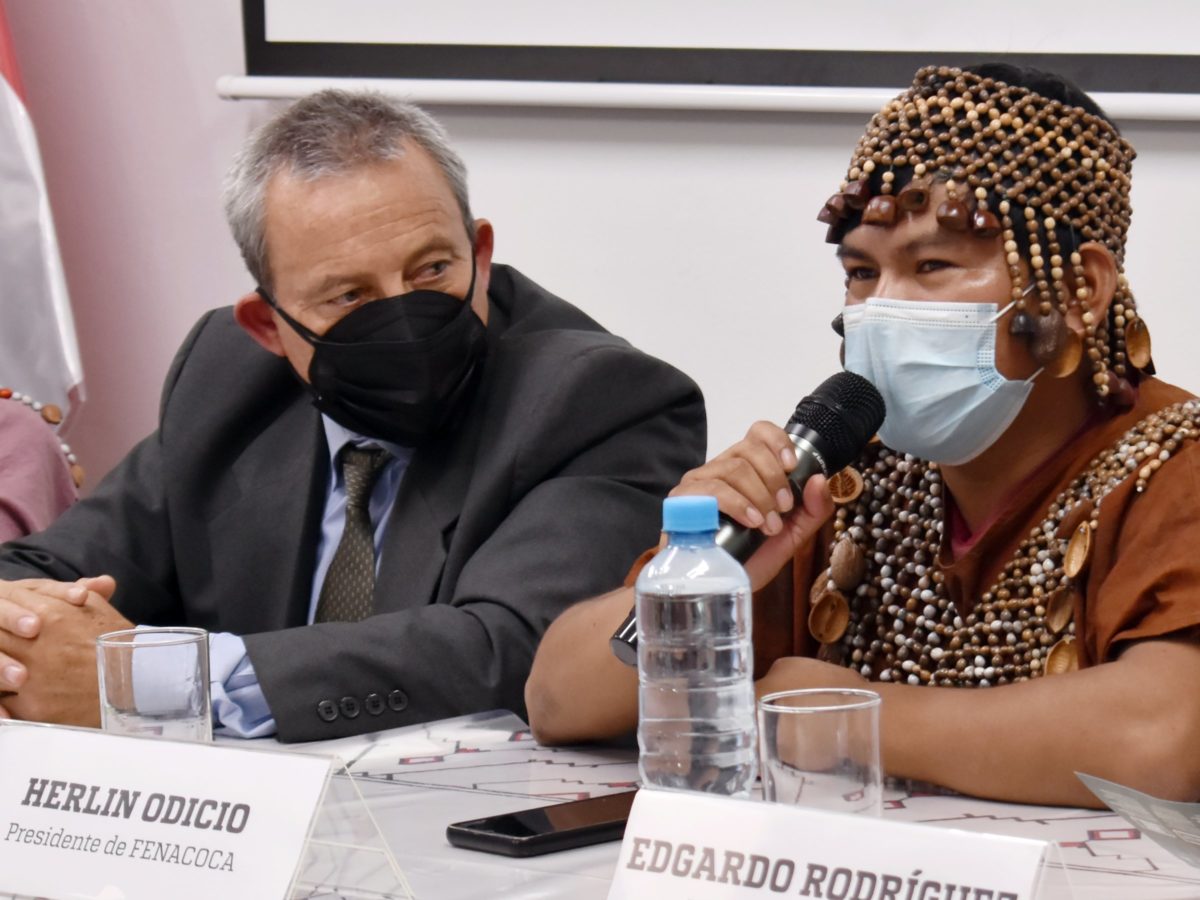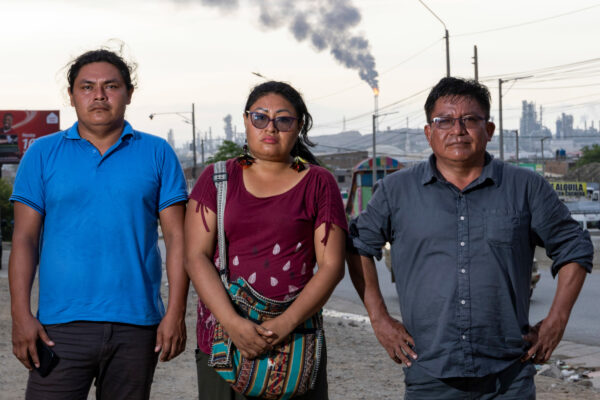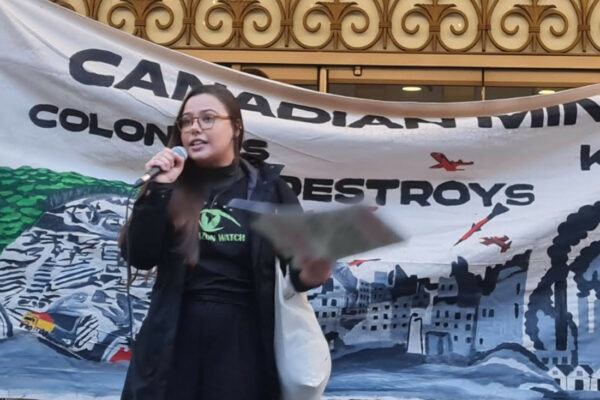While Peru is in an ongoing political crisis, the Indigenous movement clamors for justice. The demands are clear: prevent the killings of threatened Earth defenders, pursue legal actions against the murderers, and guarantee Indigenous territorial integrity.
According to the latest Global Witness report, Peru is among the ten most dangerous countries for Earth defenders. Since 2011, more than 45 environmental rights defenders have been killed there. Most recently, Indigenous leader Ulises Rumiche, was shot dead on April 20, 2022.
In addition to the continuing assassinations, many activists are subject to continuing intimidation. Herlín Odicio, president of the Federation of Kakataibo Indigenous Communities (FENACOKA), receives ongoing death threats. Just this past week, several unknown people on motorcycles watched and followed him from a distance. This is not the first time that Herlín has been under surveillance or received death threats for his unflagging work to protect the Amazon. In September 2020, narcotraffickers approached Herlín, offering to pay him approximately $130,000 per flight to allow planes loaded with drugs to take off from his community. When he refused, the death threats started.
Amazon Watch has accompanied Herlín Odicio since 2020. Given the recent increased efforts to intimidate him, we helped him escape from his territory and shelter in a safe place while the situation calms down. Herlín always returns to his community to fight on behalf of future generations. He says, “If many years ago the leaders would have denounced [the first settlers], perhaps today we would be walking without fear.” Despite his courage, he is prepared for the worst. He fears assassination, as has befallen four other Kakataibo Indigenous leaders in recent years.
Since the pandemic started, more than 17 Earth defenders have been killed in Peru. The most recent Kakataibo leader assassinated was Yenser Rios, killed in 2021 while confronting narcotraffickers in Huanuco. His death reminded the Kakataibos of the tragic killing of Arbildo Melendez, a Kakataibo leader from the Unipacuyacu community, who was killed on April 12, 2020.
The reason leaders are targeted is always the same: their opposition to drug trafficking and illegal logging within their territories, as well as their vocal demands for land titling of their communal territory. Last week, the trial against Arbildo’s murderer began. Though the defendant has confessed to killing Arbildo, their sentence may ultimately be minimal, because of mediocre work by the Prosecutor’s Office. This trial excludes the presumed intellectual authors of Arbildo’s killing, the higher-ups who may have ordered, paid for, or otherwise encouraged the murder. Currently, with the support of our Amazon Defenders Fund, Arbildo’s wife Zulema Guevara is receiving legal counseling to object to a potential lenient judgment for the perpetrator: A one-year sentence with no prison time.
We hope justice is served in Arbildo’s case and that it does not take eight years, as in the precedent-setting Saweto case. In September 2014, four Ashéninka Indigenous leaders from the community Alto Tamaya Saweto were brutally murdered for denouncing illegal logging between Peru and Brazil. Edwin Chota, one of the murdered Ashéninka leaders, reported to authorities that illegal logging mafias were operating in his community. He denounced that the logging concessions were overlapping with the territories of his community. However, authorities did not take him seriously since the community did not have official land titling. Edwin Chota – similar to Arbildo Melendez, Herlín Odicio, and many other community leaders across the Peruvian Amazon – had demanded the titling of Saweto for years prior to his death.
A year after the killings of the four leaders, following intense international scrutiny and pressure, the Saweto community finally obtained their land title. The victims’ relatives still continue the fight for justice, and they have also been threatened by the murderers. After eight years of fighting, the trial started on April 4, 2022 and there will be 26 hearings. The outcome of this case could offer a precedent for how Arbildo’s killing will be judged. We hope that the Saweto verdict will send a powerful message to the other perpetrators that their crimes will not be met with impunity, and that they will face justice.
As if drug trafficking and illegal logging were not enough, Indigenous communities in Huanuco and Ucayali have to confront the widespread problem of land grabbing. Shockingly, these invasions by non-Indigenous outsiders were financed by alternative development initiatives promoted by Peru’s National Commission for Development and Life without Drugs (Comisión Nacional para el Desarrollo y Vida sin Drogas – Devida in Spanish), which itself received past assistance from the U.S. Agency for International Development (USAID) for land titling, according to its website.
The struggle started in the early 2010s, when settlers (colonos) from southern Peru arrived looking for lands for coca production. Without the consent of local Indigenous communities, they settled on Kakataibo territory. In 2012, Devida and the Regional Government of Huanuco signed an agreement for carrying out land titling within the communities. The invaders took advantage of Devida’s sloppy individual titling program and titled their irregular settlements. The program legitimized the invaders and, paradoxically, contributed to increased coca production in the region, attracting more drug traffickers and violence. More than 15,000 individual titles within the Kakataibo territories were issued during this period, affecting the community land titling of the Kakataibo territories.
After becoming aware of the situation, Amazon Watch and Kakataibo leaders raised concerns over U.S. funding and involvement in Devida’s project implementation with the U.S. Embassy in Lima and U.S. Congressional representatives in Washington, D.C. Following several meetings with Indigenous organizations, including the Kakataibo Federation, USAID-Peru denied that its funding was used for land titling activities. Additionally, we have worked closely with the Kakataibo Federations to engage with other embassies in Lima, and supported them in their advocacy against Devida’s failed Alternative Development Strategy.
In collaboration with Peruvian organizations, we recently helped organize the public event, “Two years without Arbildo Melendez.” The forum featured statements by Herlín Odicio and Marcelino Pangoa, current president of the Unipacuyacu community. Beyond the powerful statements of these Indigenous leaders, the event also included presentations by Peruvian authorities from the Human Rights Prosecutor’s Office, the Ministry of Justice and Human Rights, and Devida itself.
Ricardo Soberón, Devida’s new president, began by apologizing for the role his institution has played in the issuance of individual land titles. He signaled that the Peruvian state has been promoting extractive activities for 30 years with a vision of development that does not include Indigenous peoples. Soberón committed to support Arbildo’s cause and to provide economic resources and technical assistance to the regional government in order to expedite land demarcation and finally title Arbildo’s community.
A few days after Devida’s announcement, the Ministry of Justice invited Kakataibo community leaders, including Herlín Odicio, to a high-level meeting with several vice ministers on May 11 in Puerto Inca, a town bordering the Huánuco and Ucayali regions. There, government representatives are expected to present a new plan to make the area secure enough to conduct the land titling process and evict all those engaged in illegal activities inside Kakataibo communities.
Most recently, prompted by the latest threats to Herlín and others, a consortium of embassies and the United Nations in Lima issued a public statement of concern for human rights defenders via social media. It was an important signal of international attention, underscoring the risks that environmental and human rights defenders face and acknowledging “illicit economies such as narcotrafficking, land trafficking, illegal logging and illegal mining with negative impacts in the territories of Indigenous peoples.” Importantly, the statement highlights the need to investigate and take concrete action in response to every threat, attack, and form of violence.
Beyond confronting all of the individual threats, it is crucial that the government finally deliver on its promise to grant the many pending Indigenous community land titles and not back down because of possible social conflicts with coca farmers in the area. To that end, it will be important for the international community to keep the pressure up. We can be sure that illegal loggers and narcotraffickers won’t rest and are already using every corrupt power at their disposal to maintain the status quo. In the name of advancing Indigenous rights and protecting the Amazon, we can’t let that happen.














